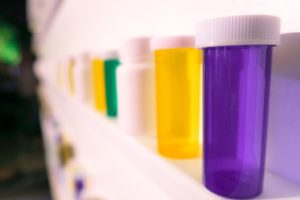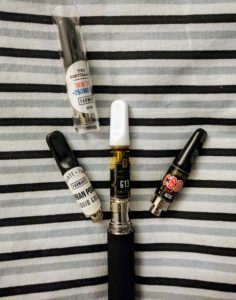It is my interpretation that the (decreasing) population that still disapproves of weed and still stigmatizes cannabis use holds the belief that a push towards legalization is motivated by the desire of many to just “get high.” It would feel paradoxical, then, for those lesser educated cannabis critics to know that the prominent cannabinoid (or chemical constituent of the cannabis plant) that has captured the greatest amount of public interest lately, is one that does not act to get the user “high” at all. Indeed, a large amount of the growing interest centering around cannabis is compellingly due to the compound cannabidiol, or CBD, which has no mind-altering effects, but a wealth of claimed medical applications. CBD has even been featured as the star of miraculous memoirs from patients, who are either regaining their lives or reclaiming their childhoods following the discovery of this abundant plant compound. CBD has been rumored to provide treatment for people who could previously find no other pill or prayer on the planet that would allow remission from their devastating ailments.
One of the first really wonderful stories I had heard about the healing powers of CBD was that of Charlotte Figi. After only about 3 months of life, it was discovered that Charlotte suffered from a rare form of epilepsy, one that even a heavy cocktail of drugs would not be able to control. At five years of age her physical and mental health was deteriorating considerably due to her condition, as well as from the side effects gained by filling her body with failed cures. Her parents then turned to some low THC and high CBD cannabis oil as their last resort, despite all of the public and personal feelings of disapproval. Thankfully though, the cannabidiol in her system turned out to be a key fitting into a lock; after developing an oral CBD dosing schedule, Charlotte became free of her hourly seizure attacks, experiencing only infrequent episodes, usually during sleep. After CBD, the Figi’s found out what Charlotte’s laughter sounded like. And, after the Figi’s gave CBD a chance, their daughter experienced tranquility in her life, for pretty much the first time ever.

In addition to curing rare epilepsy in children, other stories I had heard about CBD also revolved around healing other callous and devastating illnesses. I had heard of Rick Simpson and his Phoenix Tears that devoured tumors, along with apparently thousands of individuals claiming that CBD oil had freed them entirely from cancer. I watched a viral video of a man with Parkinson’s disease, whose violent and completely debilitating tremor disappeared after a few minutes of dosing with cannabis. I also have had a special interest in paying attention to Montel Williams and his advocacy for using cannabis products to treat Multiple Sclerosis, so therefore, I was also fairly aware of the benefits of CBD for muscle spasm, degenerative diseases, and neuropathic pain. And in general, all of these stories brought out feelings of sympathetic joy for the healing of others, a sense of awe and worship towards nature, plus a comforting sense confirming that the cannabis plant was really made for us as humans.
However, all of those stories I had heard in the media about the astounding medical benefits of CBD made me feel like dosing with CBD for my much less severe ailments was a bit like bringing a pistol to a fist fight. I am also not usually too averse to the effects of THC, so I definitely relish in the happy high feelings I get when I medicate my own symptoms, which include: ever present anxiety, stomach pains, appetite loss, and trouble sleeping. Although, as more and more benefits of CBD were elucidated, it became more evident to me that a CBD regimen could be an asset to almost anyone’s life. Importantly for me, it became known that, in addition to affecting the CB1 and CB2 receptors, CBD also binds directly to the serotonin 1 receptor, the same receptor that SSRI’s and anti-anxiety medications do their work on. What this means that CBD is an essential component in cannabis that may mitigate symptoms of mood disorders, as well as anxiety-related sleep disturbances.
Willing to try CBD for its specific role in managing anxiety, but unwilling to give up all of the high that comes with using cannabis as medication, I quickly learned the difference between what are known as CBD-rich products, versus CBD-dominant products. A CBD-rich product is one that may have an equal THC:CBD ratio, or at least 4% more CBD than THC, while a CBD-dominant product has very little THC included. There is also another important distinction with CBD products, and that is whether the CBD was derived from hemp or from the whole cannabis flower. A CBD extract derived from the whole flower may have up to 5% THC included, while CBD derived from hemp will have zero THC; this means that hemp-derived CBD products should be legally available anywhere and that using them won’t make you fail a drug test. Although hemp-derived CBD (pure CBD isolate) is not without its caveats, and it is actually a less effective way to medicate with CBD. The superiority of CBD-dominant products with small amounts of THC is due to what is known as the “entourage effect,” which asserts that cannabinoids work better when they are all united together. Additionally, if the presence of trace amounts of THC worries you, know that CBD has properties that counteract some of the effects of THC, and therefore those small amounts of THC in whole flower derivatives still won’t make you feel “high.”

I started my personal CBD discovery journey looking for products that would allow me to feel some of the highs associated with THC, while still focusing on effectively medicating my symptoms, in other words CBD-rich products. I learned later, however, that I hadn’t really done enough research to really buy a product exactly suited to my own needs. I had heard buzz in the medical community about cannabis isolate cartridges and decided I would try a vape tank loaded with concentrate as my first dab into cartridge vaping.
Sources:

